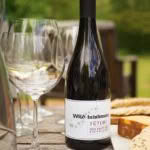Pluck of the Irish: An Otago winemaking legend’s latest project takes him back to his roots
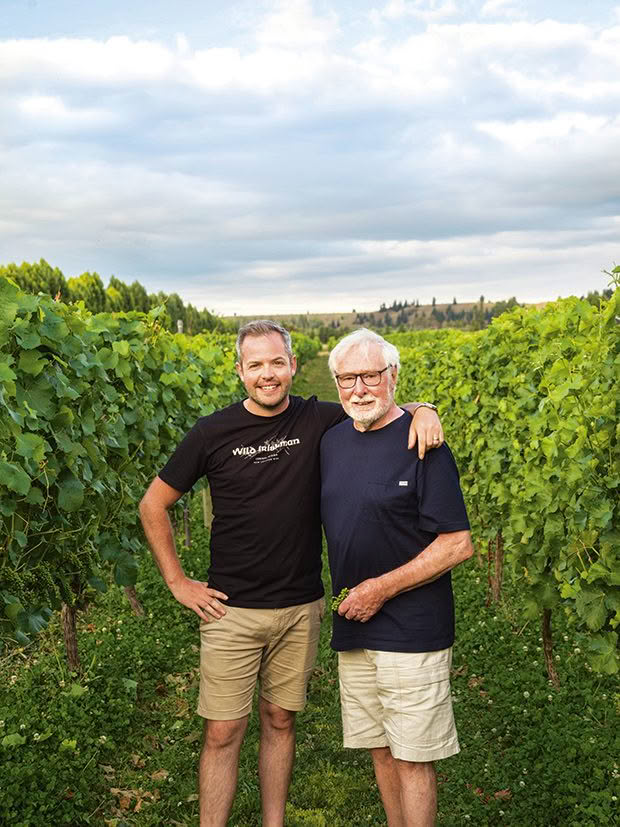
Wild Irishmen x 2: Brian Shaw and Alan Brady.
The man often referred to as the godfather of Central Otago wine for having the chutzpah to plant grapes in barren Gibbston Valley land when many frowned upon such horticultural foolery, is still chasing the perfect pinot well into his 80s.
Words: Claire Finlayson Photos: Rachael McKenna
Alan Brady is certainly celebrated for his wine achievements but, it turns out, he is also a spectacular failure. He’s monstrously bad at retirement. When he tried to prise himself from the wine industry in 2005, he was rubbish at it. He proved this by founding his third wine company, Wild Irishman, the following year. “It was supposed to be the vehicle for a cruisy little ride into the sunset — a wee retirement hobby.” Now aged 86, Alan has been studiously “unretiring” for the past 17 years, and that hobby is now one of Central Otago’s leading boutique wine brands.
It’s mainly pinot noir’s fault. Alan once described his obsession with this notoriously fickle wine variety as “a disease that I’m not seeking relief from”. The affliction first took hold back in the 1980s when he was a television journalist. Having emigrated from Northern Ireland in 1960 to work on newspapers, he ended up in the more pressurised world of television news and current events reporting. After stints with the New Zealand Broadcasting Corporation and the TV One newsroom in Dunedin, he coveted some work-life balance.
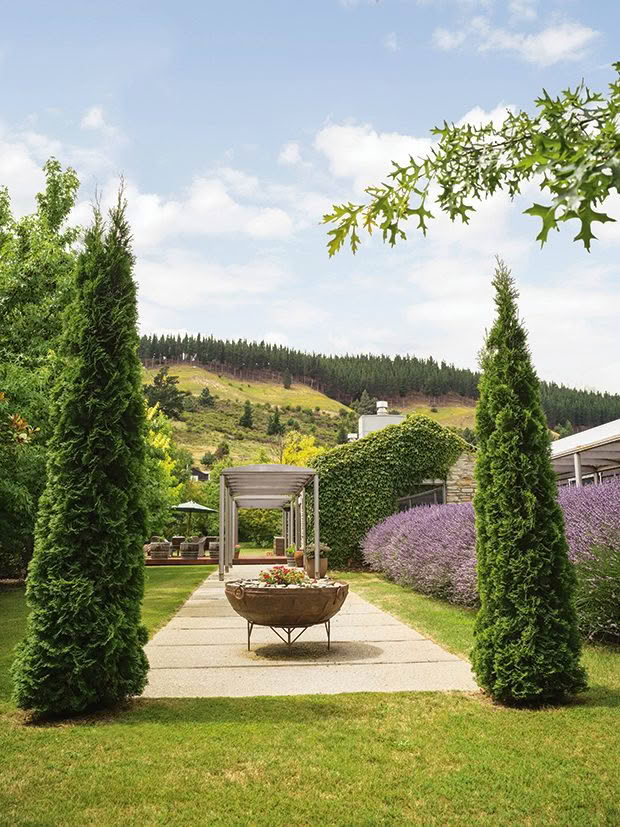
Alan’s home in Clyde. He’s smitten with Central Otago: “I like the energy of the place. There’s something about the mountains, lakes and climate — it’s a challenging environment, but it attracts people who aren’t afraid of the unknown.”
Against expert advice, Alan planted pinot noir grapes on an arid plot of land in Gibbston that he and his then-wife Denise purchased as a Central Otago weekend retreat. It was an audacious move for someone with zero winemaking nous, but fortune favoured this bold man: he went on to found Gibbston Valley Wines in 1981, Mount Edward Wines in 1997 and played a pivotal role in nudging Central Otago into the spotlight as one of the world’s leading pinot noir regions.
Alan is bored with his own viticulturally victorious backstory though. Forward momentum is the thing: “I’m a futures person. I’m far more excited about what’s going to happen than what did. You learn every year from watching and listening to what nature is telling you. Wild Irishman was a way for me to stay involved in the mystical process of turning grape juice into wine.”
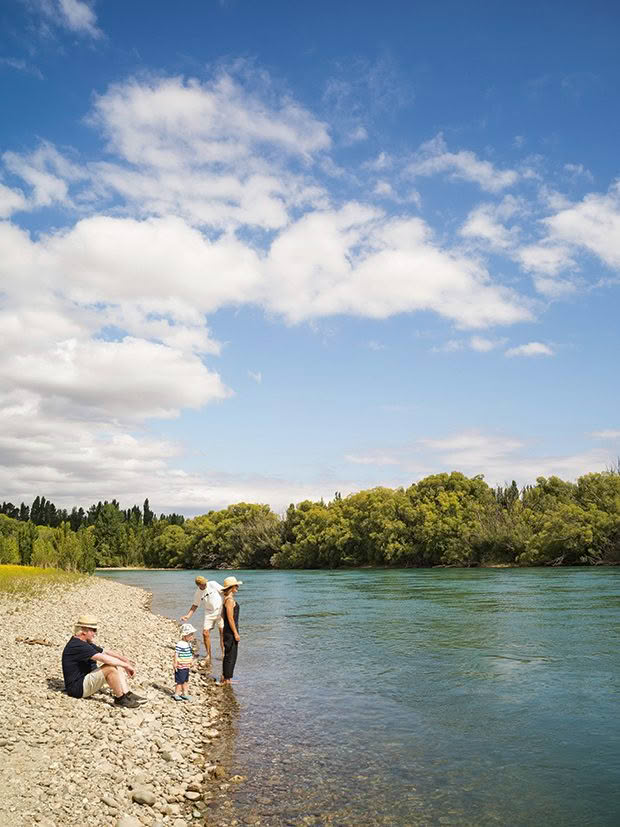
The Tūtiri vineyard backs onto the Clutha River and has its own “private” beach.
That an octogenarian known as one of the founding fathers of Central Otago wines still collects new mentors is a resounding nod to Alan’s humility. He’s more interested in talking about other people’s triumphs: “One of the most significant things to happen to me in the past few years is meeting a Frenchman called François Millet — he’s a rock-star winemaker from Burgundy. His philosophy is just wonderful. It’s gentle and empathetic. It’s all about listening to nature and sensing the energy of a vineyard.”
All that active listening to nature is another contributor to Alan’s unretirement. After four decades of keeping a watchful eye on matters meteorological, the Brady body is increasingly in sync with the seasonal rhythms of the vineyard. Does he still tense up during the mercurial spring months while on frost watch? “Absolutely. I can show you the weather station that I watch at 3am. I look at the graphs in bed.”
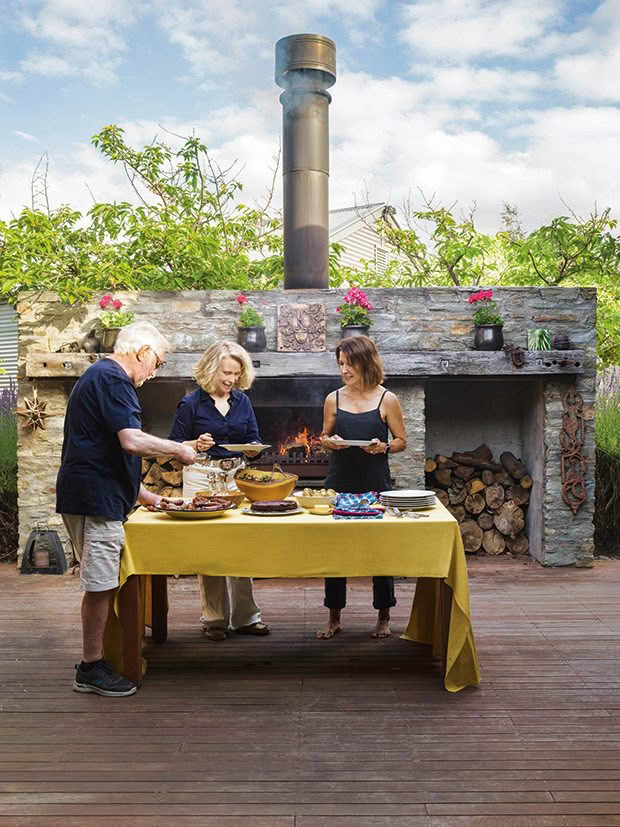
Alan with two of his daughters, Susan and Jen (on the right). Jen says her new role as “vineyard landlady” is a sign of familial wine fascination rubbing off on her, rather than a cunning way to keep an eye on her father. “Dad is way too independent to need watching. He’s always been an ideas-and-projects guy, and as soon as one project is underway, you can guarantee there’s another vision brewing.”
There’s relief in the wings, though. Fellow Irishman and winemaker Brian Shaw recently bought half shares in Wild Irishman and has moved to New Zealand with his family to try and thwart this nocturnal graph-watching. When they met in 2014 (while Brian was in New Zealand on a working holiday), they discovered they were both born and bred in Northern Ireland in towns an hour’s drive apart. Though Brian was in nappies when Alan was producing Central Otago’s first commercially released wines, the two men are kindred spirits. “We’re the same person,” says Brian, “just 50 years apart.”
It’s more than just Irish kinship at work here. “He’s like the son I never had,” says Alan. “We’re a great match — he has energy, passion, winemaking experience from two hemispheres and a very modern wine education. And I’m the old guy who’s been scratching in the dirt here since day one. We should balance each other well.”
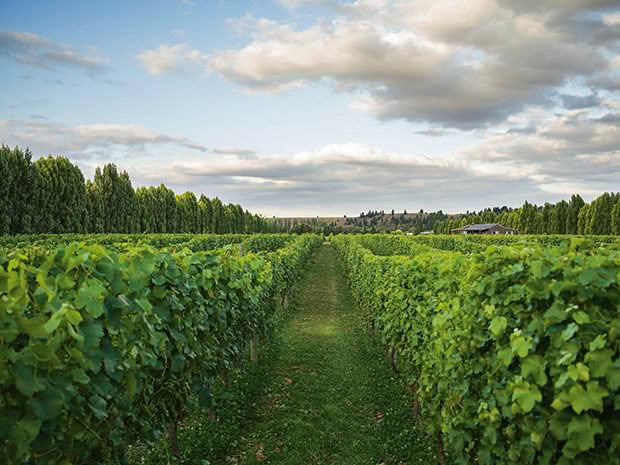
Brian agrees: “Alan knows the soils, the climate, the weather and all the effects these have on the wines. He’s a walking encyclopaedia of Central Otago. I learn so much from him and his enthusiasm genuinely makes me happy. I need him around as much as he thinks he probably needs me. As long as I can make his life a little easier so he can enjoy the fun side of winemaking, I’m happy. He’s done so much for me. I owe it to him to work my arse off so that he can enjoy the process of winemaking.”
So what could be left for a wine legend like Alan to chase after four decades in the industry? He’s keen to cultivate a less meddlesome relationship with his grape charges — in both the vineyard and the winery. “In the early days, we blasted the land with weedkillers and horrible chemicals to kill everything that moved. It was a scorched earth viticulture back then.” Less is now more in the winery too. “We’ve tended in the past to embellish that with winemaking but now we’re learning to step back a bit. So, there’s no winemaker ego involved — it’s wines without cosmetics.”
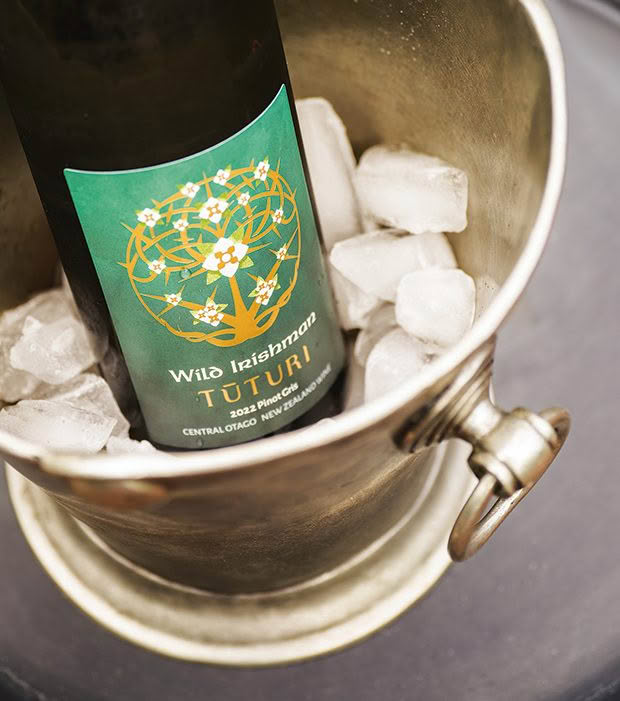
This hands-off approach (known as minimal intervention winemaking) is terroir-forward — which is to say, faithful to its specific environment. The Wild Irishman terrain is currently spread across six vineyard sites: three in Gibbston, one in Bannockburn and two near Alexandra.
The most recent of these, Tūturi, was purchased by Alan’s daughter Jen Watson and her husband (another Brian) in an act that can only be described as blatant filial enabling of the retirement-averse Brady behaviour. Jen says retirement was never a realistic option for her father. “I’ve never known Dad to be idle in his waking hours. Winemaking and all that goes with it is what gets him out of bed every day.”
Why is her father such a good pinot noir pioneer and such a bad pinot noir retiree? “Determination? Stubbornness? A combination of the two. Dad’s just like the vines that put up a stubborn fight against the elements year after year — he likes to defy the naysayers and thrive in tough conditions.”
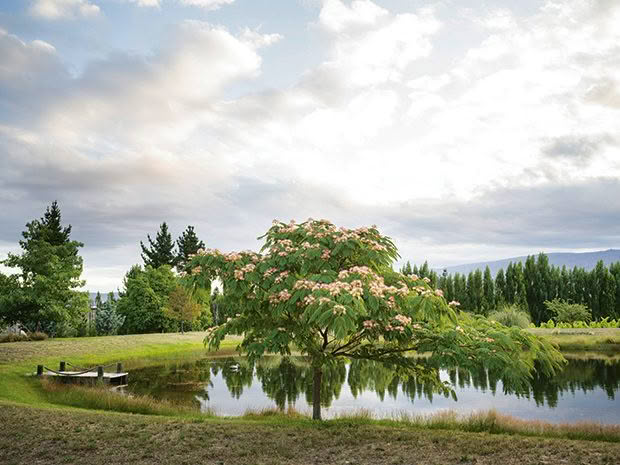
Tūtiri vineyard’s irrigation pond.
Tūturi, down the road from Alan’s Clyde home, is the headquarters of Wild Irishman Wines. “My daughters [Susan, Jen and Tara] have always been hugely supportive of me and the things I’ve done. But there’s a real family involvement now. It’s fantastic — it’s a dynastic thing for me.”
Wild Irishman Wines has morphed from a quiet hobby that paid for itself into a serious business. Alan estimates production has increased by 400 per cent in the past five years and the pinots are now enjoyed as far afield as England and Ireland. “I’m glad I didn’t retire because I’ve learnt a heck of a lot in the past 17 years. It’s been a great journey. I’ve been a part of an industry from its birth and I’m still here making wine — which is ridiculous at my age.”
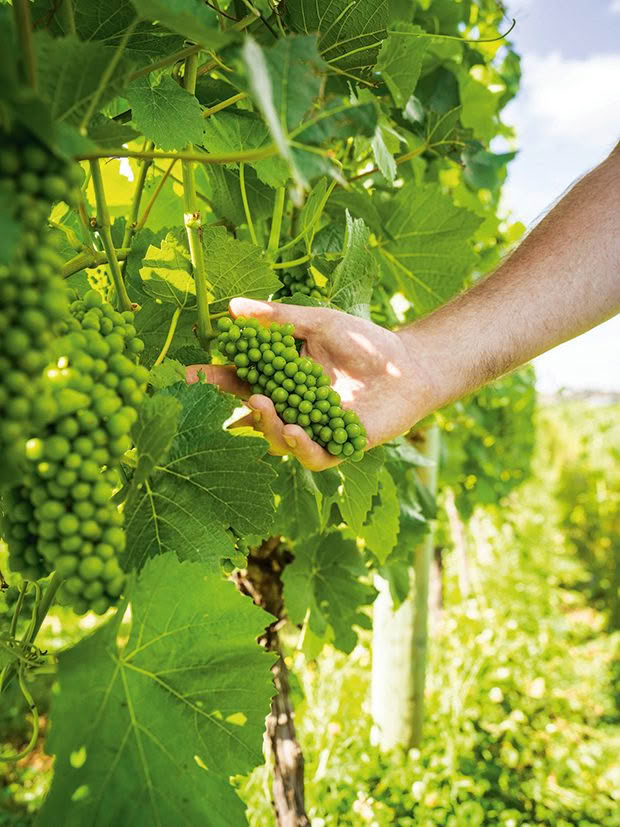
Now that there’s another wild Irishman aboard, things should get less ridiculous — especially if Brian manages to put restrictions on Alan’s 3am screen time.
THE BRADY WINE JOURNEY
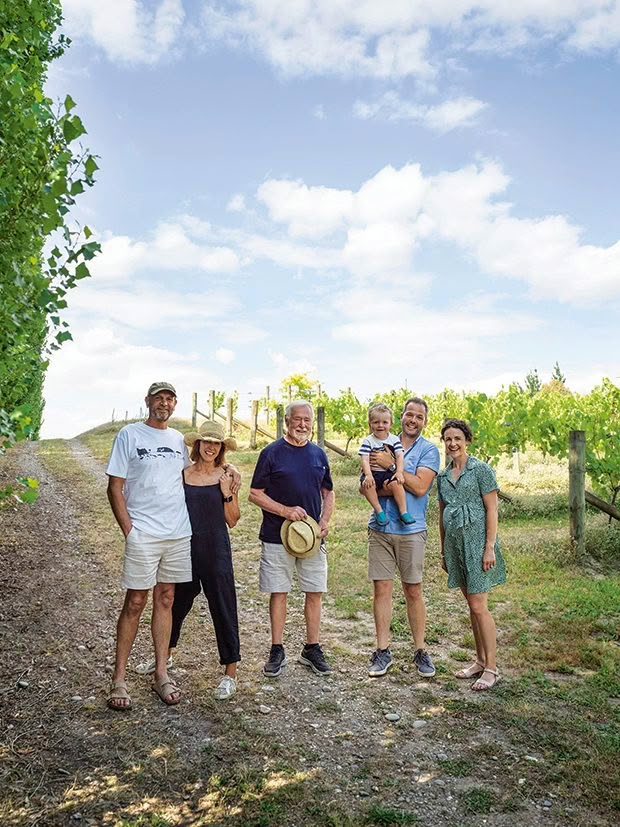
Brian Watson (Alan’s son-in-law) with wife Jen, Alan, Brian Shaw and wife Kelly with son Charlie. The younger Wild Irishman, says of the more senior one: “The man has changed my life. He opened his 40-plus years of winemaking and grape-growing knowledge to me. That doesn’t happen to everyone. What an incredible guy to learn from.”
1976 – Purchased land in Gibbston as a weekend retreat
1981 – Established Gibbston Valley Wines and planted some of the region’s first grapevines
1987 – First commercial vintage of Gibbston Valley Wines bottled
1996 – Made a Member of the New Zealand Order of Merit (for services to the wine industry)
1997 – Established Mount Edward Wines
2005 – Tried to retire
2006 – Established the Wild Irishman label
2010 – Published his memoir, Pinot Central: A Winemaker’s Story
2011 – Received the Sir George Fistonich Medal (awarded to “Legends of New Zealand Wine”)
2013 – Inducted into the New Zealand Wine Hall of Fame
2015 – Made a Fellow of New Zealand Winegrowers
2021 – Combined forces with Brian Shaw to form Wild Irishman Wines Ltd
WILD IRISHMAN
The name of Alan’s wine venture, Wild Irishman, is genius on many levels. It’s a salute to the Brady ancestry and the nickname European settlers gave to matagouri, the prickly plant that abounds in Central Otago.
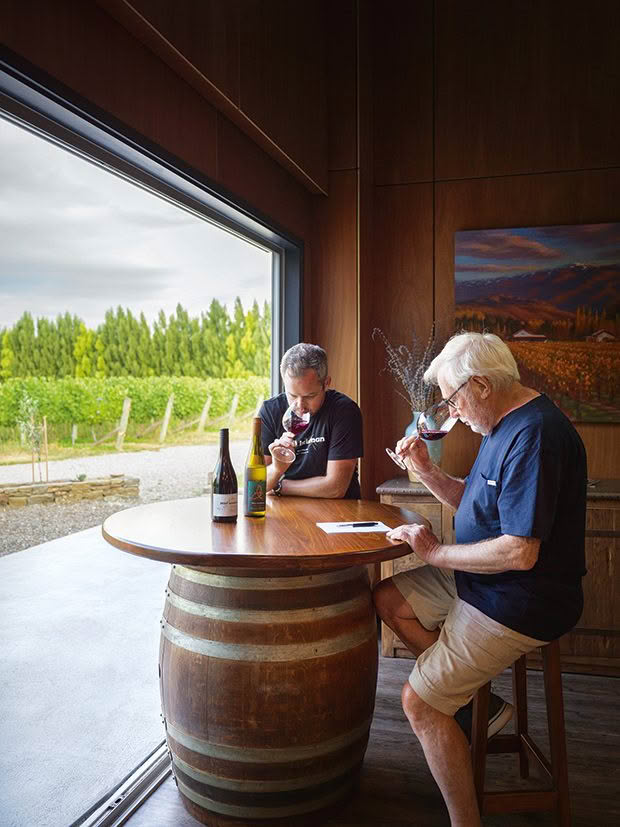
Brian and Alan sampling their Tūtiri vineyard spoils. Alan is no fan of wine snobbery. “There are so many ways you can appreciate wine, and there’s no right or wrong. What’s important is to try to understand the essence of the wine and get a glimpse of what it says to you about a place and a year.”
As a drought-tolerant shrub, matagouri represents resilience. “As an emblem, it looks ugly,” says Alan. “But I love it as a metaphor for all the pioneers and survivors of this region, whether they were goldminers or plants. We were definitely survivors because we weren’t expected to succeed.” But perhaps the name’s most (unwittingly) clever flourish, is how prescient it was, given the subsequent partnership with Irishman Brian Shaw. Alan thinks Brian is probably wilder than him, so will inhabit the name perfectly. “I am a bit wild all right”, says Brian. “The label resonates on a few different levels. Pinot noir is
a survivor in the arid conditions of Central — much like Alan and the matagouri.”
Love this story? Subscribe now!
 This article first appeared in NZ Life & Leisure Magazine.
This article first appeared in NZ Life & Leisure Magazine.
